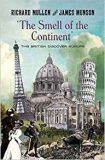The Smell of the Continent by Richard Mullen and James Munson
| The Smell of the Continent by Richard Mullen and James Munson | |
|
| |
| Category: History | |
| Reviewer: John Van der Kiste | |
| Summary: A very entertaining, thoroughly-researched and often amusing account of English travel throughout Europe between 1814 and 1914, full of insights as to how the English saw their continental brothers and vice versa. | |
| Buy? Yes | Borrow? Yes |
| Pages: 456 | Date: June 2009 |
| Publisher: Macmillan | |
| ISBN: 978-0230741904 | |
|
| |
When Frances Trollope landed at Calais in the 1830s, she overheard a conversation between two travellers, the younger commenting on the dreadful smell, the older and more experienced telling him it was the smell of the continent.
From this comes the title of an extremely entertaining and informative account of British travel and tourism on the continent during the century that began with the fall of Napoleon and ended in the outbreak of the First World War. Once peace came in 1814, or in the words of one commentator, when our island prison was opened to us, those who had the time and money to visit Europe, now had the freedom as well. The young John Ruskin, inspired by an illustrated book on Italy to go and see the works of art shown on its pages for himself, was only one of many.
Those who made the journey overseas for their holidays often came back with mixed impressions. By 1850 Britain had become Europe's first urban and industrialized society, and going abroad meant visiting countries where the pace of life was slower and seemed less modern. In theory, at least, though some were quick to moan about the procrastination of the people across the channel. Paris was regarded as Europe's most beautiful city, the centre of art and fashion, synonymous with good food. One could have too much of a good thing, particularly the newly-married couple who visited the palace of Versailles, thought they saw every picture in the building, and were not sorry when they came to the last – or those who held that the city's morgue and slaughter-houses were a sight no gentleman should miss although not a pleasant one for ladies.
Then, as now, the English and the Europeans often regarded each other as a race apart. According to Edward Lear, the Italians regarded Britons as insane because they drank water instead of wine, and they always washed themselves, sometimes twice a day. Fanny Kemble was convinced that England was the only place in the world where people were not disgustingly dirty. Another writer noted that the French were sure that anyone going to the top of a pyramid or to the top of Mont Blanc would invariably meet an Englishman reading a newspaper. And I was amused to read of Thackeray's father, who lived in Paris and called his dog Waterloo, much to the irritation of everyone else who lived in the same street.
It was inevitable, but interesting to note, that historical events often had a bearing on the popularity of certain countries. Until the middle of the century, a trip up the Rhine was the most popular holiday destination. A love of all, or most things German, particularly the smaller kingdoms and duchies which exuded an air of dreamy romanticism, gradually disappeared with the advent of Prussian-dominated Germany, personified partly by its military power and partly by the cement works and quarries along the Rhine which symbolised the young empire's industrial strength. France and Italy, which still represented a more gentle way of life, were the main beneficiaries.
Throughout the era, there was often talk of a cross-Channel tunnel, until the scheme was firmly rejected by Parliament in 1882. Many saw no need for one, particularly as it took an astonishing 73 hours to reach Paris from London in 1816, a time reduced to six and a half hours by daily crossings from Victoria Station via Dover and Calais to the French capital by July 1914.
This book is full of fascinating nuggets, while at the same time providing a fascinating insight into its subject, and a glance at the sources consulted is ample testimony to the exhaustive research involved.
Our thanks to Pan/Macmillan for sending a copy to Bookbag.
For another read on a similar subject in the same era, albeit to a different part of the world, may we recommend A Corkscrew is Most Useful: The Travellers of Empire by Nicholas Murray.
Please share on: ![]() Facebook,
Facebook, ![]() Twitter and
Twitter and
![]() Instagram
Instagram
![]() You can read more book reviews or buy The Smell of the Continent by Richard Mullen and James Munson at Amazon.co.uk Amazon currently charges £2.99 for standard delivery for orders under £20, over which delivery is free.
You can read more book reviews or buy The Smell of the Continent by Richard Mullen and James Munson at Amazon.co.uk Amazon currently charges £2.99 for standard delivery for orders under £20, over which delivery is free.
![]() You can read more book reviews or buy The Smell of the Continent by Richard Mullen and James Munson at Amazon.com.
You can read more book reviews or buy The Smell of the Continent by Richard Mullen and James Munson at Amazon.com.
Comments
Like to comment on this review?
Just send us an email and we'll put the best up on the site.


